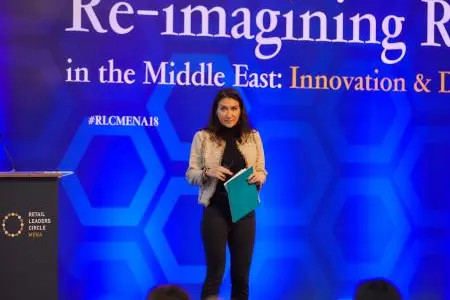PHOTO
The 2018 Middle East Sentiment Survey by McKinsey & Company reveals that consumers in the region are becoming more cost-conscious, less brand-loyal and rapidly shifting purchasing behaviours. Approximately 55 per cent of consumers are now actively looking for savings across markets, with those in Saudi Arabia leading the pack. They are finding creative ways to spend less and more actively considering alternative brands than in previous years. The survey was launched last week at the Retail Leaders Circle in Dubai by Peter Breuer and Gemma D’Auria from McKinsey & Company.
Amongst the survey’s findings, almost 35 per cent of consumers now look to buy their preferred brands at any cost instead of trying out alternative brands at cheaper prices. This is down from almost 45 per cent in April 2017.
The survey also revealed that 78 per cent of consumers in the region changed their buying habits to save money. Multichannel shoppers have cut spending in all channels and increasingly favour discount formats and chain grocery stores.
UAE and KSA consumers more bullish
KSA and UAE consumers felt they were forced, over the last two years, to make adjustments to their spending habits and now feel more confident about spending disposable income, in order to regain some of their lost purchasing power.
In KSA, 34 per cent of consumers are looking to buy their preferred brands at any price point, as compared to 42 per cent in April 2017. In UAE, this number was 34 per cent as compared to 41 per cent in 2017.
“Interestingly, consumers in UAE and KSA responded similarly to most questions that were put to them and despite fluctuating financial sentiment, they believe they are saving and delaying purchases less than in Spring 2017,” says Gemma D’Auria, leader of the Retail practice in McKinsey’s Middle East office.
McKinsey’s 2018 Middle East Sentiment Survey classifies shoppers into five categories based on their behaviour - savvy cost-cutters, thrifty brand loyalists, selective splurgers, trade-down converts and multichannel shoppers.
Trading up or down, away from mid-market brands
Across the globe, more consumers traded up to more expensive brands, while fewer consumers traded down to cheaper options. Although the overall consumer sentiment illustrates a shift towards cost consciousness, the market remains fragmented with a consistent and sizeable number of consumers still willing to trade up to higher value or luxury brands.
In the region, almost 16 per cent traded down and 11 per cent traded up in this year’s survey. Consumers in UAE and KSA continue to move away from mid-market brands. UAE was ranked 8th and KSA was ranked 11th in the list of countries where consumers were trading up, from among a group of 30 countries. In the UAE, 14 per cent traded down and 12 per cent traded up while in the KSA 16 per cent traded down and 11 per cent traded up in this year’s survey.
Lower brand loyalty
In the region, approximately 54 per cent of those who have opted to trade down were happy with this decision with 46 per cent admitting a desire to return to their old brands. In the KSA, 45 per cent of those trading down expressed satisfaction, up from 41 per cent in Sept 2016.
“People are becoming less brand loyal. Earlier, they were looking more for preferred brands in cheaper channels, now they are more inclined to try and stick with lower cost brands – a shift which we attribute to an increase in the perceived and real quality of private label and lower tier brands,” added Gemma D’Auria.
Winning in retail
Winners in retail today use data inputs such as consumer sentiment to drive analytics driven decision making and those that do are significantly outperforming their peers. Decision making has always been data and algorithm driven, but three trends are accelerating the evolution - unprecedented levels of data, tumbling costs and powerful new computing capabilities and algorithms.
According to Peter Breuer, leader of the Retail practice in McKinsey’s EEMEA region: "Quality enhancement and a wider assortment of private label is the real threat for brands. Top retail performers are transforming their organizations to be analytics and data driven and this is possible even with limited public data. Proprietary insight on consumers is the retailer’s biggest asset and retailers need to focus on business impact while deploying analytics-driven decision making. They need to create impact fast, but in parallel work on roadmap, enablers and capabilities.”
The survey also revealed that the shift to e-commerce is happening faster than it was last year. It’s seen not only among affluent consumers but across all income tiers and the regional trend is in line with the rest of the world.
- Ends -
Download the 2018 Middle East Sentiment Survey by McKinsey & Company at http://www.mckinsey.com/middle-east-sentiment-survey
Related article: https://www.mckinsey.com/middle-east/our-insights/retailing-in-the-middle-east-how-to-recapture-profitable-growth
About McKinsey & Company
McKinsey & Company is a global management consulting firm, deeply committed to helping institutions in the private, public and social sectors achieve lasting success. For over eight decades, our primary objective has been to serve as our clients' most trusted external advisor. With consultants in more than 100 offices in 60 countries, across industries and functions, we bring unparalleled expertise to clients anywhere in the world. We work closely with teams at all levels of an organization to shape winning strategies, mobilize for change, build capabilities and drive successful execution.
For more information, please contact:
Sandeep Sharma
Ketchum Raad Middle East
(d) +971 4 425 8990
© Press Release 2018



















